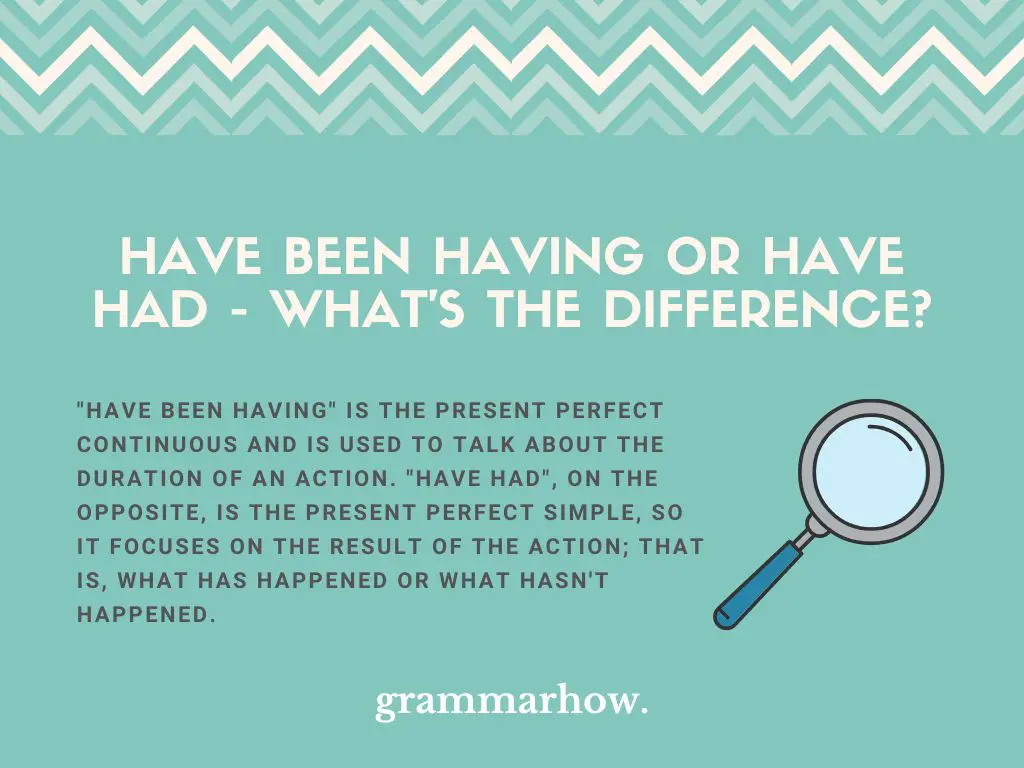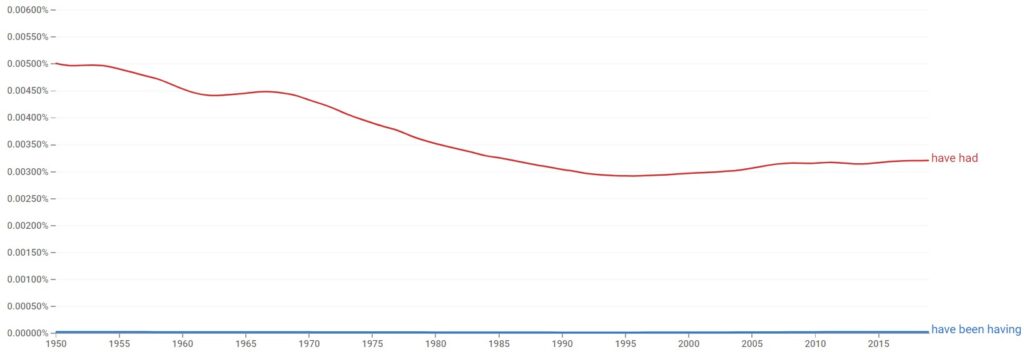Correct use of verb tenses helps us to communicate in a more precise way. What is the difference between “have been having” and “have had”? What implications does it have in terms of action? Please read on, this article will show you what each of these verb tenses implies.
Have Been Having or Have Had – What’s the Difference?
“Have been having” is the present perfect continuous and is used to talk about the duration of an action. “Have had”, on the opposite, is the present perfect simple, so it focuses on the result of the action; that is, what has happened or what hasn’t happened.

Colloquially, you may hear these two expressions used as synonyms. Therefore, “have been having” and “have had” may be interchangeable. However, in strictly grammatical terms, these verb tenses place the focus on different aspects, making their meanings subtly different.
Have Been Having
The present perfect continuous, like “have been having”, is a complex verb tense that connects the past and the present. We use it to draw attention to the duration of action. Or even to highlight the action more than the result of it.
In addition, the present perfect continuous is used to refer to unfinished actions, that is, they began in the past and continue in the present moment, as well as to refer to actions that have been completed very recently (and of which, probably, we can still observe some trace).
The structure of present perfect simple is quite simple:
Subject + have/has + been + verb + (ing)
Let’s see some examples of “have been having” in a sentence:
- I have been having some ups and downs these past few months.
- Sofia has been having an argument with her boss for two hours.
- During these last three weeks, we have been having meetings with the team leaders of all the branches.
- Unfortunately, Sarah has been having some pain since the last surgery.
- The company’s minority shareholders have been having difficulty liquidating the remaining assets.
- I have been having some difficulties with my knee; I’ll postpone the match.
- Have you been having headaches lately? I’ve seen you take many aspirins!
Have Had
“Have had” is the present perfect simple. It is also a complex verb tense that connects the past and the present, although the difference is that the focus is on the results of the action, that is, what has happened or what has not happened.
Let’s review some of its principal functions. We can use it for actions that started in the past and continue in the present. Also, for those actions in which the execution time has not ended. And finally, for those actions that are constantly repeated in an indeterminate time between the past and the present.
It is most likely that every time we hear “have had”, it is followed by an adverb of time to emphasize the moment in which the action happened. The most frequently used are just, already, for, since, and ever.
Let’s see some examples of “have had” in a sentence:
- My father gave me opportunities he has never had.
- The customer report is based on the experiences they have had with our brand.
- After the stock crash, we have had an extraordinary uptick in sales.
- Once you have had an allergic reaction to walnuts, you should always avoid them.
- Those who have had the privilege of working under this leadership will always be proud of what we have achieved.
- Sally was concerned that she has had so little feedback about her performance
- I have had an amazing experience at Wimbledon; everyone should go!
Which Is Used the Most?
When checking the popularity levels of words, there’s no more useful tool than the Google Ngram Viewer. Let’s take a look at the conclusions after looking at the chart.

We can see a flat curve with zero usage percentage for “have been having” from the beginning of the 20th century. While “have had”, presents a sustained fall until the 80s, when its ratio of use stabilizes.
Final Thoughts
“Have been having” is a verb tense that can be interchangeable with “have had”, although they have different meaning implications. Whereas “Have been having” focuses on how long something has lasted, “have had” focuses on the outcome of what has or has not happened.

Martin holds a Master’s degree in Finance and International Business. He has six years of experience in professional communication with clients, executives, and colleagues. Furthermore, he has teaching experience from Aarhus University. Martin has been featured as an expert in communication and teaching on Forbes and Shopify. Read more about Martin here.
